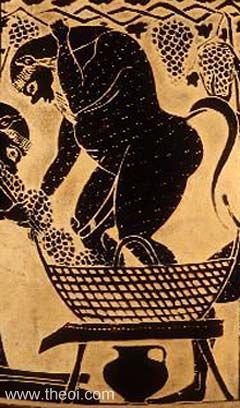LENEUS
Greek Name
Ληνευς
Transliteration
Lêneus
Latin Spelling
Leneus
Translation
Of the Wine-Trough

LENEUS was the Seilen demi-god of grape-treading and the dance of the wine trough (lenôs). He was one of the three Seilen sons of the elder god Seilenos (Silenus).
Leneus was probably the father of the Lenai (Lenae)--satyr-like, wine-making daimones in the retinue of the god Dionysos.
PARENTS
SEILENOS (Nonnus Dionysiaca 14.96)
OFFSPRING
THE SATYROI (Nonnus Dionysiaca 14.96)
CLASSICAL LITERATURE QUOTES
Strabo, Geography 10. 3. 10 (trans. Jones) (Greek geographer C1st B.C. to C1st A.D.) :
"The [daimones called] Silenoi (Silens)and Satyroi (Satyrs) and Bakkhai (Bacchae), and also the Lenai (Lenae) and Thyiai (Thyiae) and Mimallones and Naïdes Nymphai (Naiad Nymphs) and the beings called Tityroi (Tityri), [are companions] of Dionysos."
[N.B. The Lenai are a multiplication of the Seilen Leneus.]
Nonnus, Dionysiaca 10. 393 ff (trans. Rouse) (Greek epic C5th A.D.) :
"[Dionysos presides over contests of the Satyroi (Satyrs) :] Bromios [Dionysos] measured the ground for the furlong race . . . Then he urged the Satyroi (Satyrs) to go in and win. Springheel Lyaios (Lyaeus) [Dionysos] cried his summons aloud, and first up leapt windfoot [Seilenos] Leneus (Winepress), then on either side of him highstepping Kissos (Cissus) (Ivy) and charming Ampelos (Vine) stood up. They stood in a row, confident in the quick soles of their straightfaring feet. Kissos flew with stormy movement of his feet just skimming the top of the ground as he touched it. Leneus was running behind him quick as the winds of heaven and warming the back of the sprinter with his breath, close behind the leader, and he touched footstep with footstep on the dust as it dropped, with following feet: the space between them both was no more than the rod leaves open before the bosom of a girl working at the loom, close to the firm breast. Ampelos came third and last. Dionysos saw them out of the corner of his eye, and melted with jealousy that the two competitors should be in front, afraid they might win and Ampelos [the god's lover] come in behind them; so the god helped him, breathed strength into him, and made the boy swifter than the spinning gale. Then Kissos, first of the two in the race, striving so hard for the prize, stumbled over a wet place on the shore, slipt and fell in the sandy slush; Leneus had to check the course of his feet, and his knees lost their swing: so both competitors were passed and Ampelos carried off the victory.
The old Seilenoi shouted Euoi! Amazed at the victory of the youth. He received the first prize with soft hair flowing, Leneus took the second full of envy, for he understood the jealous trick of Lyaios and his passion; Kissos eyed his comrades with look abashed, as he held out his hand for the last prize discontented."
Nonnus, Dionysiaca 14. 96 ff :
"[Rhea summons the rustic spirits to the army of Dionysos for his campaign against the Indians :] Old Seilenos (Silenus) also was ready for the fray, holding the fennel-stalk, that horned son of the soil with twiform shape. He brought three festive sons: Astraios (Astraeus) was armed for battle; Maron came too, and Leneus followed, each with a staff to support the hands of their old father in his travels over the hills. These ancients already weak and vinebranches to support their slow bodies: many were the years of their time, from these had sprung the twiform generation of the muchmarried Satyroi (Satyrs)."
Nonnus, Dionysiaca 14. 386 ff :
"[During a battle of Dionysos' Indian campaign :] At the mouth of the Astakid lake many a son of India was cut up by the steel of the Kouretes (Curetes) . . . [and the Seilenos (Silen)] Leneus broke off a crested peak from a mountain, and lifting this in his hairy hand, he cast the jagged mass among the enemy."
Nonnus, Dionysiaca 29. 243 ff :
"[During the Indian War of Dionysos :] Morrheus [the Indian general] drove off a company of Seilenoi (Silens), beating them with his poleace : at one shout of the driver Astraios (Astraeus) was shaken, Maron fled, Leneus collapsed, the three sons of shaggyhaired Seilenos, who himself sprang up out of mother earth unbegotten and self-delivered."
SOURCES
GREEK
- Strabo, Geography - Greek Geography C1st B.C. - C1st A.D.
- Nonnus, Dionysiaca - Greek Epic C5th A.D.
BIBLIOGRAPHY
A complete bibliography of the translations quoted on this page.